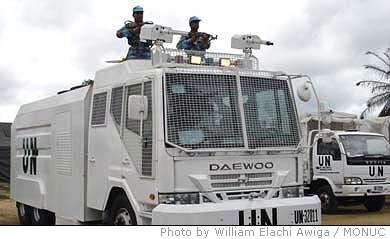 24 November 2006 ? United Nations peacekeepers in the Democratic Republic of the Congo (DRC) will support the Congolese army if needed in enforcing a 48-hour security ultimatum in the capital to remove forces loyal to the losing candidate in last month?s presidential elections, the top UN envoy to the strife-torn country has said.
24 November 2006 ? United Nations peacekeepers in the Democratic Republic of the Congo (DRC) will support the Congolese army if needed in enforcing a 48-hour security ultimatum in the capital to remove forces loyal to the losing candidate in last month?s presidential elections, the top UN envoy to the strife-torn country has said.
The Special Representative of the Secretary-General in the DRC, William Lacy Swing, said that some 50 supporters of Vice-President Jean-Pierre Bemba have already left the capital as a result of the ultimatum imposed by the Congolese army following Tuesday?s violence in Kinshasa.
The ultimatum came a day after the Supreme Court building and police vehicles were burned during clashes between police and Mr. Bemba?s supporters over a court filing challenging the provisional results of the elections, which forecasted Mr. Bemba?s defeat by incumbent President Joseph Kabila.
?Mr. Swing said that the Congolese army, if necessary, will be backed by UN peacekeepers in enforcing the ultimatum, whose implementation is proceeding peacefully,? a UN spokesman said today in New York.
The UN Mission in the DRC (MONUC) strongly condemned this week?s violence and again called on Wednesday for all sides involved to resolve any differences peacefully.
?A lot of blood has already been spilt in this country, and the Congolese have understood and accepted that the ?hatchet must be buried.? MONUC reminds those who refuse to understand this, that protests can only be held by peaceful and legal means, through the rule of law,? MONUC spokesman Kemal Saiki said.
The elections for president, national and local assemblies, which began at the end of July and culminated with the presidential run-off on 29 October, were the first free polls in more than four decades. They were the largest and most complex elections that the UN has ever helped to organize and were aimed at cementing the vast and impoverished country?s transition to stability after a brutal six-year civil war, which cost 4 million lives through fighting and attendant hunger and disease. Factional fighting has remained a problem since the end of the war, especially in the east.
In another development in the DRC, Mr. Saiki said today that a UN human rights team had found a mass grave in an army camp in eastern Ituri district holding around 30 bodies, including women and children, adding that the military prosecutor is investigating and two soldiers have been arrested.
In addition to its peacekeeping role, MONUC inaugurated a gardening project this week to help the capital?s street children, who are often accused of sorcery and maltreated by society. The project will help pay for the children?s schooling, food and other needs, the mission said, adding it is one of over 200 similar initiatives completed over the past few years aimed at improving the lives of the most depressed sectors of society.
Related articles
- • UN Security Council Calls on Rwanda to Stop Supporting M23 Rebels in DR Congo (February 22, 2025)
- • 'Deadly environment' plus 'political and social' obstacles hinder Ebola fight, Security Council hears (July 24, 2019)
- • Ebola outbreak declared an international Public Health Emergency (July 17, 2019)
- • Felix Tshisekedi Sworn In as DR Congo President (January 24, 2019)
- • Constitutional Court Declares Tshisekedi Winner of Presidential Election (January 19, 2019)
- • Felix Tshisekedi Vows to Be the President of All Congolese (January 10, 2019)
- • Felix Tshisekedi Elected DR Congo President (January 10, 2019)
- • DR Congo Delays Results of December Election (January 6, 2019)
- • Jean-Pierre Bemba Returns to DR Congo (August 1, 2018)
- • At least 30 dead after massacres in Ituri (March 2, 2018)
- • Botswana Urges Joseph Kabila to Step Down (February 26, 2018)
- • No elections in DR Congo in December without electronic voting machines: INEC (February 13, 2018)
- • US Warns DR Congo Against Electronic Voting for Delayed Election (February 12, 2018)
- • Felix Tshisekedi accuses INEC of illegally prolonging Kabila's mandate (October 24, 2017)
- • DRC Seeks Arrest of Presidential Candidate Moise Katumbi (May 19, 2016)
- • Papa Wemba Is Buried in Kinshasa (May 4, 2016)
- • Papa Wemba Awarded Highest National Honor as Thousands Pay Tribute (May 2, 2016)
- • DR Congo reach final of African Nations Championship (February 3, 2016)
- • Political tensions 'running high' in DR Congo ahead of 2016 elections (October 7, 2015)
- • Rights Groups: DR Congo Must Free Pro-democracy Activists (April 13, 2015)
- • Police Open Fire on Crowd Protesting Election Law Change (January 19, 2015)
- • ICC Confirms 14-Year Sentence Against Thomas Lubanga (December 1, 2014)
- • Etienne Tshisekedi Evacuated to Belgium for Medical Treatment (August 16, 2014)
- • ICC sentences Germain Katanga to 12 years (May 23, 2014)
- • 15 dead in football match stampede in Kinshasa (May 12, 2014)
- • Kerry Calls on Kabila to Honor Constitution (May 4, 2014)
- • Kerry in DR Congo for Security Talks (May 3, 2014)
- • Security Council extends UN mission, intervention force in DR Congo for one year (March 28, 2014)
- • Death toll in Lake Albert boat accident rises to 108 people (March 24, 2014)
- • ICC finds Germain Katanga guilty of war crimes and crime against humanity (March 7, 2014)
Tags: |







